PNND Update 14
November 2006
1. North Korea nuclear test and Six Party talks
Invitation to endorse the parliamentary statement on North Korea and nuclear testing
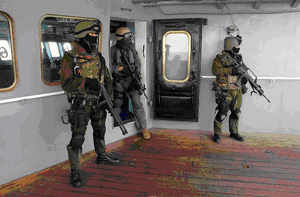 |
|
US troops practicing an interception and boarding of a ship as part of the Proliferation Security Initiative |
|
Tensions in North East Asia flared up following North Korea’s nuclear test on October 9 with the US and Japan imposing tough sanctions, the United Nations Security Council adopting limited measures and the United States leading an upgrade of Proliferation Security Initiative (PSI) activities including a strengthened commitment to intercepting North Korean bound ships suspected of carrying military or nuclear related materials.
US Secretary of State Condoleezza Rice recently toured North East Asia encouraging US partners to step-up their engagement in PSI. Japan has indicated a willingness to consider greater involvement. South Korea has been hesitant out of concern that intercepting and searching North Korean ships could lead to armed clashes with its neighbor.
In the past two weeks North Korea and the United States have showed some flexibility. North Korea has agreed to return to the Six Party talks (which include China, Japan, North Korea, Russia, South Korea and the US) and the US has demonstrated a readiness to also hold bilateral talks with North Korea and to re-look at some of the financial sanctions. US and North Korean officials had a direct meeting in Beijing on Oct. 31, which the North said at the time led to their decision to return to the six-party talks.
However, the situation remains volatile. If the past is anything to go by, a sustainable solution will be difficult and talks could easily break down preventing progress towards denuclearization of the region.
PNND thus invites parliamentarians to endorse the parliamentary statement on North Korea and nuclear testing which encourages a diplomatic solution to the crisis. The statement will be distributed to the leaders and chief negotiators of the Six Party talks, and also to the United Nations ambassadors of every country (in light of the requirements of UN Security Council resolution 1718).
-
Roundtable on Denuclearisation in North East Asia – National Diet (Parliament) of Japan, Tokyo, Dec 6
PNND invites you to this non-partisan forum for legislators to discuss implementation of Security Council Resolution 1718 on North Korea, the Six Party talks, possibilities for North Korea to return to the Non-Proliferation Treaty and possibilities for the establishment of a North East Asian Nuclear Weapon Free Zone. Roundtable languages: Japanese, Korean, English.
PNND members are also invited to attend a preceding event - the PGA Annual Forum on Human Security and the Consultative Assembly of Parliamentarians for the International Criminal Court and the Rule of Law, Tokyo, Japan, 4-5 December 2006.
For more information or to register contact alyn@pnnd.org
German and Norwegian Foreign Ministers call for Nuclear Disarmament
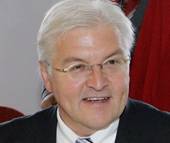 |
|
German Foreign Minister Frank-Walter Steinmeier |
|
German Foreign Minister Frank-Walter Steinmeier and his Norwegian counterpart Jonas Gahr-Store have urged the United States and Russia to take heed of North Korea's nuclear test and resume negotiations on dismantling their atomic arsenals to prevent a collapse of the non-proliferation regime.
In a joint editorial published on Saturday by Frankfurter Rundschau newspaper, the Foreign Ministers warned that North Korea's atomic test proved it was time to upgrade the nuclear Non-Proliferation Treaty (NPT).
They call on "the nuclear weapons states, particularly Russia and the United States, to fulfill their responsibility and declare they are ready to engage in further negotiations about their strategic nuclear weapons."
See: U.S., Russia urged to talk about scrapping A-bombs, By Louis Charbonneau, Reuters, November 10
- United States Congress
India-US nuclear technology deal
Invitation to endorse parliamentary letter on India-US nuclear technology deal
In the wake of the November US elections, President Bush has indicated that he intends to push through Congressional authorisation for the controversial US-India nuclear technology deal before the Senate transfers from Republican to Democrat control in January 2007.
The deal would allow the US to engage in trade with India in nuclear materials to support the Indian civil nuclear power program. The agreement requires the United States to amend its own laws and policies on nuclear technology transfer and to work for changes in international controls imposed by the Nuclear Suppliers Group (see PNND Update 12).
There are widespread concerns that the deal might provide indirect assistance to India’s nuclear weapons program and undermine the Non-Proliferation Treaty by providing nuclear technology assistance to a country which is not a Party to the treaty; thus removing a key incentive for States to remain in the NPT. The NPT has to-date been relatively successful in preventing nuclear proliferation by providing nuclear technology assistance as a carrot to those States who join the treaty, forgo nuclear weapons programs and accept international safeguards.
 |
|
Uta Zapf (Chair of the Bundestag (German Parliament) Subcommittee on Disarmament, Arms Control and Nonproliferation) |
|
In May PNND distributed a parliamentary letter on the India-US nuclear technology deal drafted by Uta Zapf (Chair of the Bundestag (German Parliament) Subcommittee on Disarmament, Arms Control and Nonproliferation) to the US House and Senate Foreign Relations Committees and the Foreign Ministers of the Nuclear Suppliers Group. Replies were received from a number of Foreign Ministers sharing the concerns expressed in the letter.
PNND will be presenting the letter again to the Senate Foreign Relations committee and other key senators in conjunction with President Bush’s request for Senate agreement for the deal before 2007. We invite parliamentarians who have not already done so to endorse the letter.
Hearings on nuclear risks and prospects for disarmament
| |
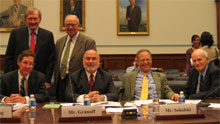 |
|
| |
Ambassador Thomas Graham, Hans Blix, Jonathan Granoff, Henry Sokolski and Dr. Frank von Hippel testifying at US Congressional Hearings on nuclear threat reduction and nuclear disarmament. |
|
On 26 September 2006, the US House of Representatives Government Reform Committee, Subcommittee on National Security, Emerging Threats and International Relations, at the suggestion of PNND Global Council member Jonathan Granoff, held a Congressional Hearing on Weapons of Mass Destruction: Current Nuclear Proliferation Challenges. The hearing, which was convened by committee chair Rep. Christopher Shays (Rep, CT), included discussion of questions including:
-
How do unilateral versus multilateral approaches to global security affect the prospects for the abolition of nuclear weapons?
-
To what extent have nonproliferation sanctions affected the policies of rogue regimes?
-
What stricter international controls over fissile material should be implemented to keep the material out of the hands of terrorists?
-
Why has the international community failed to adopt "no first use" policies?
Expert testimony was provided by Dr. Hans Blix (who led the UN efforts that successfully disarmed Iraq), Dr. Frank von Hippel (former science and non-proliferation adviser to the president during Bill Clinton’s presidency), Jonathan Granoff, former US Disarmament and Arms Control Ambassador Thomas Graham and leading representatives of the Administration.
This was a unique cross-party discussion in the US Congress of the links between non-proliferation and disarmament and the requirement to pursue nuclear disarmament. It indicates possibilities for engagement with the new US Congress on these issues.
» Subcommittee Official Report » Read unofficial transcript
» Testimony by Dr. Blix » Testimony by Amb. Graham » Testimony by Mr. Granoff
Parliamentarians and the Article VI Forum
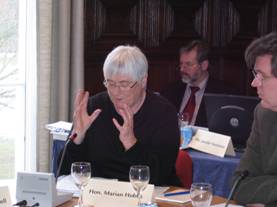
Hon Marian Hobbs MP, PNND Global Council Member and former Minister for Disarmament, speaking at an Article VI Forum meeting
There is a growing lack of consensus in the international community on nuclear non-proliferation and disarmament issues, demonstrated by the inability of the Conference on Disarmament to start negotiations on any disarmament or non-proliferation item for over 10 years, the lack of any reference to nuclear non-proliferation or disarmament in the UN 60th Summit declaration, and the failure of the 2005 Non-Proliferation Treaty Review Conference.
In order to break through this lack of consensus and initiate practical work on nuclear disarmament, the Middle Powers Initiative (MPI) established in 2005 the Article VI Forum.
MPI brings together like-minded governments and disarmament experts to explore and develop the legal, technical and political requirements for achieving a nuclear weapons free world. More than 30 countries have participated in Article VI Forum meetings at the United Nations in New York, the Clingendale Institute in the Hague and the Canadian Foreign Ministry in Ottawa.
Parliamentarians are now being invited to join the Article VI Forum meetings in order to explore the role they can take in supporting or implementing key initiatives and in proposing their own.
For further information see www.middlepowers.org
-
Central Asian Nuclear-Weapon-Free Zone
On September 8 this year, the foreign ministers of the five Central Asian States - Kazakhstan, Kyrgyzstan, Tajikistan, Turkmenistan, and Uzbekistan - signed a treaty establishing a Central Asian Nuclear-Weapon-Free Zone (CANWFZ) – thus closing another region of the world to nuclear weapons deployment.
The treaty had been negotiated two years earlier but strong objections by the US, UK, and France had prevented the Central Asian governments from moving ahead. The fact that these governments finally decided to sign the treaty despite the opposition, indicates a rising level of frustration with the Nuclear Weapon States and a desire by countries to take initiatives towards a nuclear weapons free world.
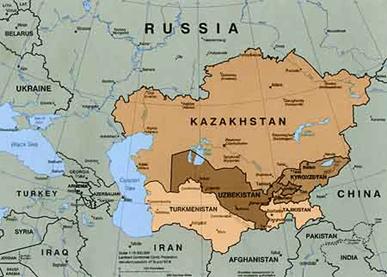
Central Asian Nuclear-Weapon-Free Zone
The new zone joins five regional zones covering Latin America and the Caribbean, the South Pacific, Southeast Asia, Antarctica and Africa. Its implementation could encourage the establishment of NWFZs in other regions such as North East Asia, the Nordic/Arctic region, Central Europe and the Middle East.
The Central Asian zone will consolidate a commitment to nuclear disarmament by a group of states which previously had nuclear weapons on their territory and continue to live in a nuclear-armed neighborhood. The region houses Russian and U.S. military bases, and is surrounded by Russian, Chinese, Pakistani, Indian, and Israeli nuclear weapons.
At the signing ceremony, Kazakh Foreign Minister Kasymoshomart Tokayev underlined the symbolic significance of the new zone, stating: "The countries of our region declared a firm commitment to the principles of disarmament and nonproliferation. This is our contribution to ensuring global security."
Text of the Central Asian Nuclear Weapon Free Zone Treaty
-
Operational Status of Nuclear Weapons
Invitation to endorse International Appeal on the Operational Status of Nuclear Weapons
The United States and Russia continue to deploy thousands of nuclear weapons on a high level of readiness to use, under a policy of Launch-on-Warning (capability to launch within a few minutes).
Steps to reduce the operational status of nuclear weapons were agreed by all States Parties to the NPT in 2000, but have not been implemented. An International Appeal by Parliamentarians, Nobel Laureates and Citizen Organisations on the Operational Status of Nuclear Weapons was presented to the United Nations Disarmament Committee in 2005 and again in 2006. It will continue to be used to promote a reduction in nuclear weapons operational status.
Following the visit of PNND Global Coordinator Alyn Ware to the Canadian Parliament in October, an additional 28 Canadian legislators endorsed the Appeal. There are now 85 parliamentarians endorsing from Australia, Belgium, Brazil, Canada, Germany, India, Italy, Netherlands, New Zealand, Norway, Russia, Sweden, Tanzania, UK and USA.
To add your endorsement contact FoE Sydney - Nuclear Campaign
-
New Zealand Minister for Disarmament unveils the Cloak of Peace and speaks to PNND Japan
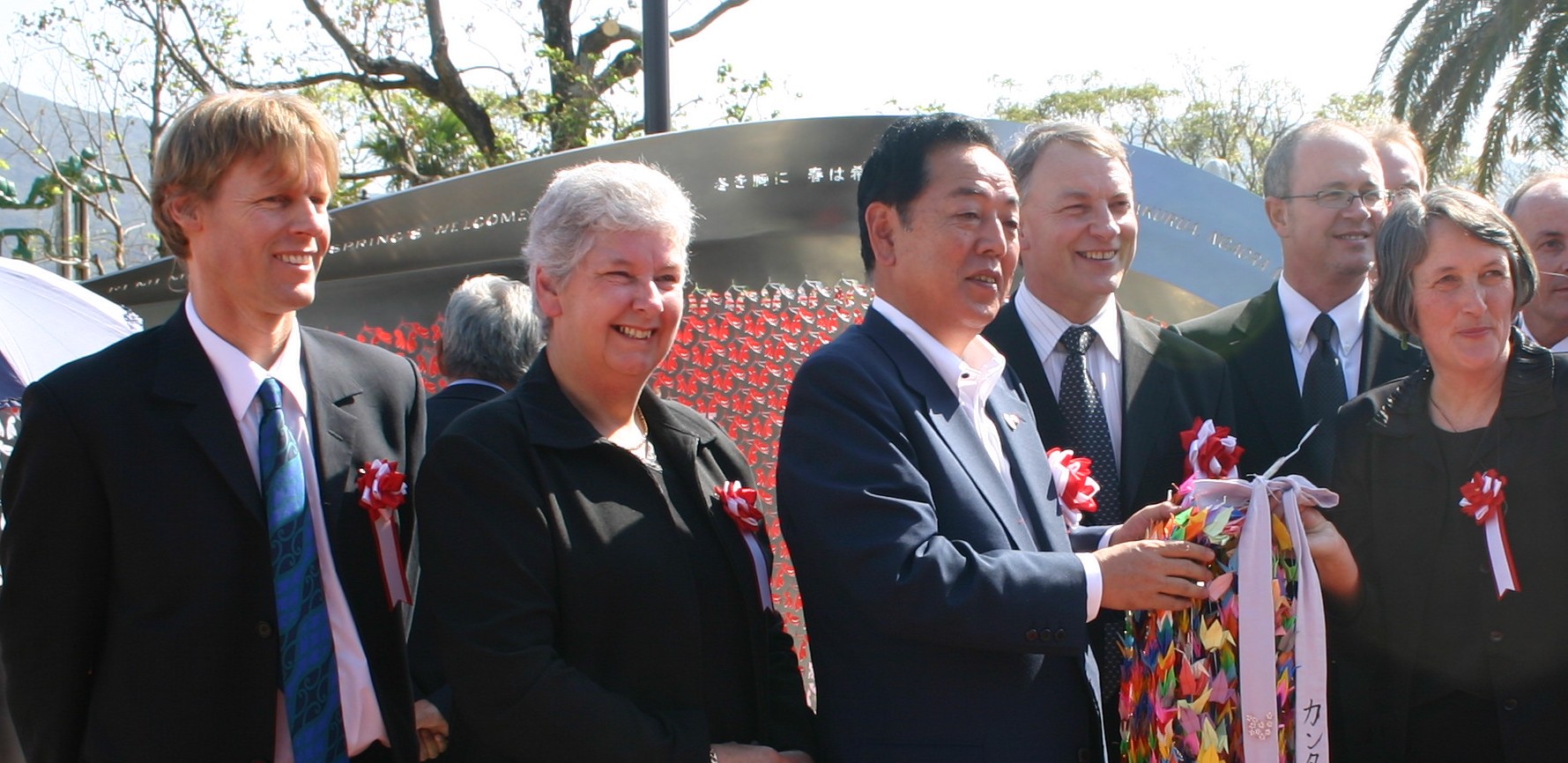
Nagasaki Mayor Iccoh Itoh with New Zealand Minister for Disarmament Hon Phil Goff, Dr Kate Dewes of The Peace Foundation of Aotearoa/New Zealand and New Zealand ambassador to Japan John McArthur
On United Nations Day (October 24) the Hon Phil Goff (New Zealand Minister for Disarmament and Arms Control, Minister for Defence and a member of PNND) addressed a cross-party group of parliamentarians in the Japan parliament hosted by PNND Japan. Minister Goff urged renewed efforts to eliminate nuclear weapons, highlighting their inhumanity and illegality and noting the 10th anniversary of the World Court opinion on nuclear weapons and the 20th anniversary of New Zealand’s legislation prohibiting and criminalizing nuclear weapons.
Prior to the parliamentary forum, Minister Goff was in Nagasaki to visit first-hand the site of the nuclear bombing in 1945, and to unveil the sculpture Te Korowai o Rangimarie (Cloak of Peace), a gift from New Zealand to Nagasaki. Te Korowai o Rangimarie commemorates the nuclear bombing and inspires action for nuclear abolition.
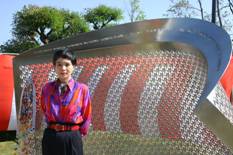
Te Korowai Rangimarie – The Cloak of Peace
-
PNND New Zealand and Africa promote the Pelindaba Treaty
In October, PNND New Zealand and PNND Global Council members from Africa sent a letter to the leaders of all African States calling for ratification and entry-into-force of the African NWFZ – the only other zone not yet in operation.
The letter, co-signed by Hon Nick Smith MP (PNND NZ Chair), Hon Marian Hobbs MP (PNND Global Council Member for NZ), Keith Locke (PNND NZ Secretary), Hon David Coltart (PNND Global Council Member for Zimbabwe) and Hon Dr Raphael Chegeni (PNND Global Council Member for Tanzania) notes that:
“We recognize there are many pressing issues which demand the attention of African governments and that nuclear disarmament might not be at the top of the agenda. Never-the-less, the threat of nuclear weapons use grows daily, whether by a State or non-State actor, by accident, miscalculation or intent. If there is a nuclear weapons use anywhere, it would be disastrous for all countries. In addition, unresolved suspicion of nuclear weapons programmes stimulates conflicts and destabilizes whole continents.”
The letter also says “As parliamentarians from countries which have ratified the respective NWFZ treaties, we believe that ratification is not a complicated process requiring detailed national implementation measures, but can be done quite easily. We stand ready to offer our support to assist you in this endeavour.” |


